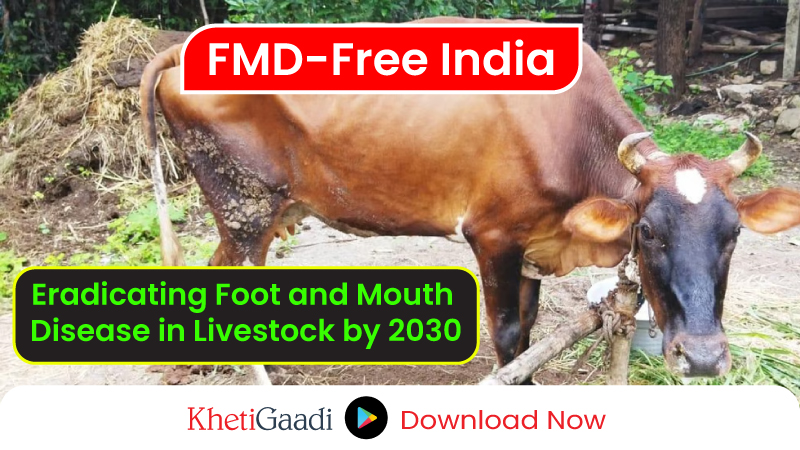A National Push for a Healthier Livestock Sector
India is making significant strides towards eradicating Foot and Mouth Disease (FMD) in livestock by 2030 through an ambitious vaccination program. Union Minister of Fisheries, Animal Husbandry & Dairying, Mr. Rajiv Ranjan Singh, also known as Lalan Singh, reviewed the ongoing efforts to achieve this milestone during a recent meeting. He emphasized the crucial role that the livestock sector plays not only in the Indian economy but also in the livelihoods of millions of farmers, particularly in rural households where women are the primary caregivers for livestock.
KhetiGaadi always provides right tractor information
Action Plan for FMD-Free India
The meeting discussed a comprehensive action plan to make India free of FMD by 2030. Key regions such as Karnataka, Tamil Nadu, Andhra Pradesh, Telangana, Uttarakhand, Punjab, Haryana, Maharashtra, and Gujarat have been identified based on sero-surveillance data. These regions, where vaccination efforts are already in advanced stages, will be prioritized for being declared FMD-free zones, which could open up new opportunities for exports.
Economic Impact of FMD and the Path to Recovery
Union Ministers highlighted the severe economic impact of FMD, which causes an estimated loss of ₹24,000 crores annually. Eradicating this disease is expected to significantly boost milk production, improve the livelihoods of farmers, and increase exports of milk and livestock products, aligning with international trade standards.
Government’s Commitment to Vaccination and Disease Control
To combat FMD and another major disease, Brucellosis, the Government of India launched the National Animal Disease Control Programme (NADCP). Under this flagship scheme, cattle, buffaloes, sheep, and goats across 21 states are vaccinated every six months. So far, 82 crore vaccinations have been administered, with the fifth round recently completed in Karnataka and Tamil Nadu. The goal is to eradicate FMD by 2030 through sustained vaccination efforts, supported by coordinated animal movement tracking, disease surveillance, and biosecurity measures.
Domestic Vaccine Production and Export Potential
Mr. Singh expressed pride in India’s ability to develop and produce all animal vaccines domestically, thanks to the Indian Council of Agricultural Research (ICAR) institutions. India is now equipped to export vaccines to select Asian countries. The government is providing technical and financial support to state governments for vaccine administration, cold chain infrastructure, and creating awareness among farmers. As part of a 100-day action plan, Mr. Singh announced the extension of FMD vaccination to all pastoral sheep and goat populations across the country. Ladakh has already begun vaccinating its flocks, with close monitoring to ensure the success of this initiative. Sentinel animals, such as sheep and goats in specific areas, will be used to detect the absence of the virus in the environment.
A Call to Action for FMD-Free Bharat
Mr. Singh urged all stakeholders, including NGOs involved in animal husbandry, to contribute to the goal of an FMD-free India. He also highlighted the crucial role of information technology in the strict monitoring and supervision of the vaccination drive, which is one of the largest in the world.
This collective effort, driven by coordinated planning and technological support, is poised to make India free from Foot and Mouth Disease by 2030, bringing lasting benefits to the country’s livestock sector and economy.
Stay tuned with us on our WhatsApp channel for more real time updates on various agriculture related schemes and innovative cultivation methods aimed at supporting our hardworking farmers.
For more detailed information, visit https://khetigaadi.com/ regularly!
To know more about tractor price contact to our executive







I’m goone tto informm mmy llittle brother,
thast he should also paay a visit this webage oon regular basis to
get updated frokm hotteest nees update.